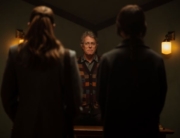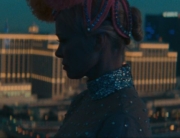What’s to be done to save the environment? There’s an early moment in the brilliant and pulse-pounding Night Moves where an earnest young woman screens a film she’s made to a room full of Oregon activists. It’s a bland call to action, the kind of thing Hollywood types often rally behind: too generalized to offend or to effect any concrete change. When pressed for specifics, the filmmaker dodges, saying the issue can’t be boiled down to a single problem or plan.
The scene brings to mind the Occupy Wall Street movement, whose well-meaning protesters were repeatedly ridiculed for not coming up with a simple list of demands to address the country’s hopelessly complicated economic woes. In contrast, Night Move’s three central characters do have a single goal: they want to blow up a hydroelectric dam.
They choose the dam as a symbol of the energy-crazed consumer culture, of suburban sprawl, of people hunting for outlets in public places to power their smartphones. Blow up a dam and “people are gonna start thinking,” as one of them puts it.
Josh (Jesse Eisenberg) is the lead conspirator, a tortured, private young man. Eisenberg’s default is to appear suspicious, or at least inwardly agitated, so he is perfectly suited to turn Josh into a modern-day Raskolnikov, vacillating between his ideals and his fear of punishment. Dena (Dakota Fanning) is a waif of an eco-terrorist. Here Fanning demonstrates an ability to spout alarmist arguments while looking as sweet and serene as a Dickensian orphan. Harmon (Peter Sarsgaard) is the potential rogue, an ex-Marine with spite to spare.
These three misfits make up Kelly Reichardt’s contemporary Monkey Wrench Gang, and when something goes wrong with their plan, they are sent spiraling out into ever-widening circles of fear and self-loathing. The story becomes a morality puzzle, as the survival instinct clashes with conceptions of right and wrong. Even the audience struggles—on the one hand wondering if the kids will pull it off, and on the other wondering if they should.
Director Kelly Reichardt and her team have talent to spare. The quiet stillness of much of the film and the elegance of the compositions are skillfully used to represent what these three are fighting to preserve. When the real world—the prosaic world, the electrified world—shows up for the first time, the effect is devastating.
What’s to be done about the environment? Opinions are easy to come by, actions less so. Perhaps the most brutal reminder of this comes when, after an hour of blood sweat and tears spent in pursuit of the goal, a character happens to mention there are 10 different dams on that one river alone.






Leave A Comment